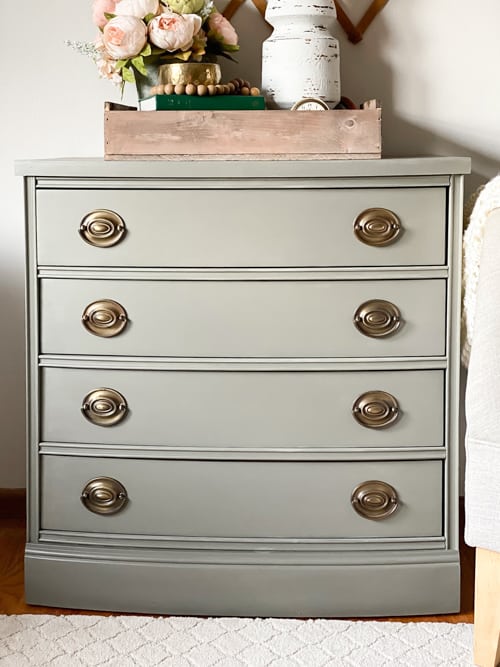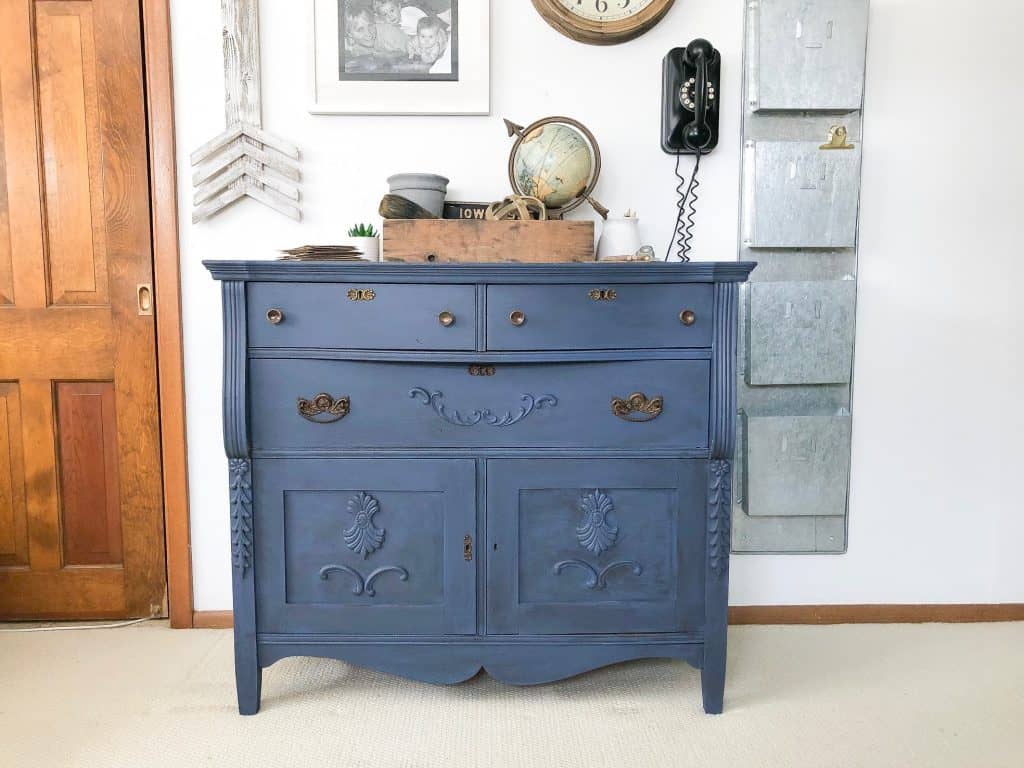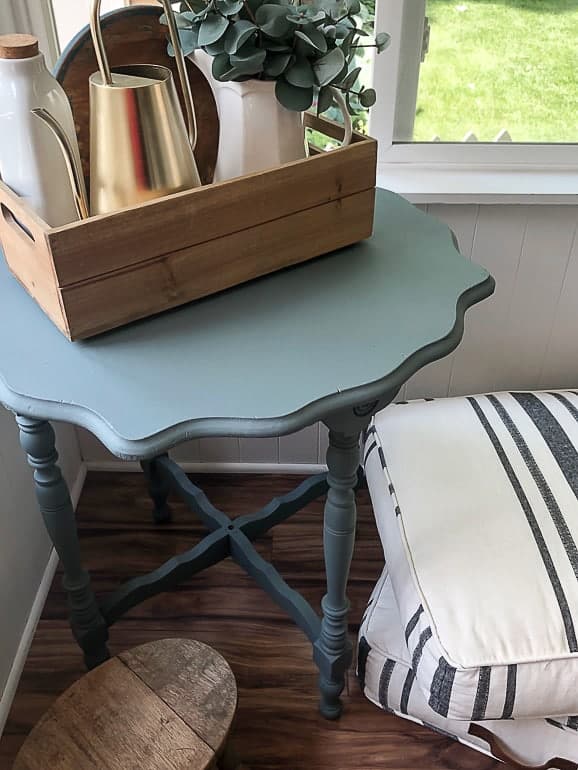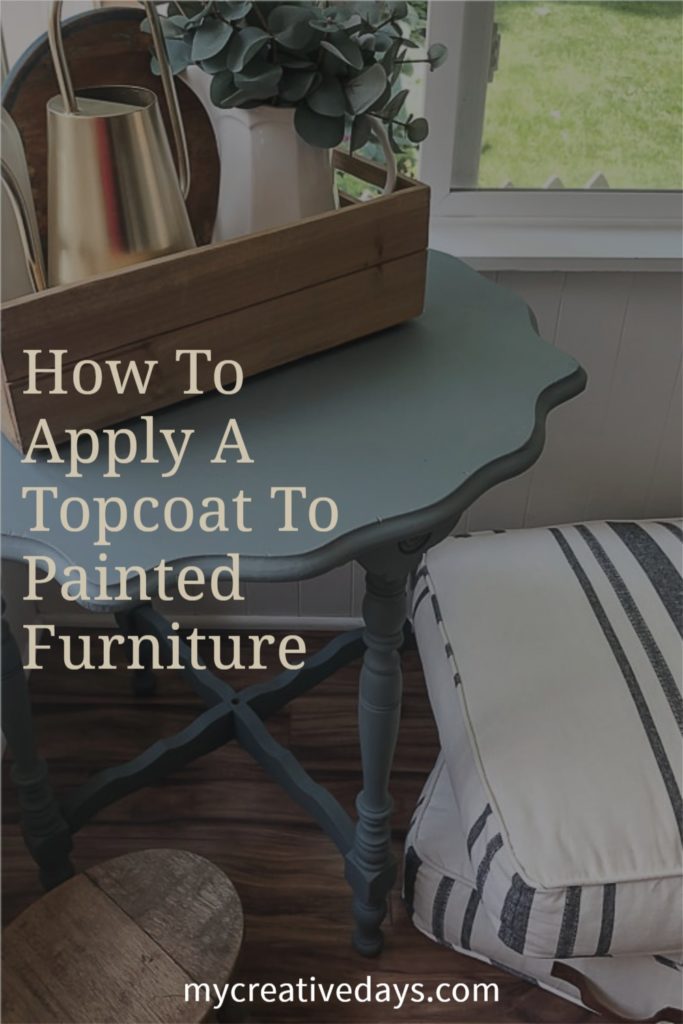Learn how to apply a topcoat to painted furniture after you have decided which topcoat to use on your finished piece.
I get a lot of questions about flipping furniture. One of the topics I get asked about most often is topcoats.
Should I use a topcoat?
What topcoat do you recommend?
When do I use a topcoat?
How do I apply a topcoat to painted furniture?
Today, I am going to answer the last question.
How To Apply A Topcoat To Painted Furniture
The application of a topcoat has everything to do with the topcoat you choose for your painted piece of furniture. If you aren’t sure which topcoat to add to your piece, I would recommend checking out my post all about the Best Topcoat for Painted Furniture. In that post, I talk all about the different options you have for topcoats and which ones I choose for different pieces.
Once you have read that post and have a better understanding of the different topcoat options, you should be able to choose the best topcoat option for your particular painted piece of furniture. Every piece will be different and I choose a topcoat based on the piece I am working on. Each topcoat is used for different reasons and having a better understanding of what they do will ensure you choose the right option for each piece.
Now, let’s talk about how to apply that topcoat.
{Affiliate links are used in this post. Click on any of the underlined links to find the products I am talking about. You can read my disclosure HERE.}

Application Tips For Different Topcoats
Application For A Clear Coat Topcoat:
If you are applying a clear coat to your piece of painted furniture, you can use a paintbrush, paint roller, or a paint sprayer. Once you work with clear coats and get more and more practice with them, you will find what works best for you when applying it. A lot of people worry they will get brush strokes in the topcoat with a paintbrush.
Most clear-coat topcoats are very thin. They aren’t the consistency of paint at all. The thinner consistency lessons brush strokes. If you are still worried about it, I would recommend trying a paint roller. You won’t get brush strokes with a roller. You can also apply a clear topcoat with this $3 sponge. It makes the application very easy and doesn’t leave any brush strokes. If you are comfortable with a paint sprayer, that is your best bet for a smooth finish with a clear coat.
My favorite clear topcoats are these and these.

Glazes:
Usually, when I use a glaze, I am looking to deepen the paint color or add some more character to the look of the piece. Like topcoats, glazes are thinner than paint. When I apply a glaze, I use a mix of a paintbrush (for hard-to-reach areas) and lint-free rags. Glazes are usually forgiving and you can work with them as you are applying them. A lint-free rag makes it easy to rub the glaze in all the places you want it.
My favorite glaze right now is this one.
Waxes:
Waxes are another option for a topcoat. They are a lot different than a clear coat or a glaze. A wax topcoat is similar to a glaze in that it will deepen a paint color and add more character, but you apply it a lot differently. I like to use this brush for applying wax. Since wax isn’t “liquid”, you need a good stable brush to push it around to where you need it to go. You could also use a lint-free rag, but I think you will find that you will like the brush a lot better.

Salve:
This is a new one to me, but I am loving it so far. I have been using this salve on SO MANY projects. Not only am I using it on furniture projects, but I am using it in my car and other areas around our home. To apply the salve, I like using a clean and dry $3 sponge or a lint-free rag. You can also use the same brush as I recommend for the wax application.
Applying a topcoat to your painted furniture will extend the life of the paint on the furniture. It will help protect against scratches, dings, and overall wear of the paint on the piece of furniture. Making sure you clean and prep the piece correctly is also extremely important in the longevity of the painted piece.
All of the topcoat options I talked about today are great choices for your painted furniture. They all “function” a little differently and definitely have a “best way” to apply them. I have been flipping furniture for more than 20 years and have learned so much along the way. I hope these tips are helpful with your next flip.
Do You Want To Make Money Flipping Furniture?
After twenty years of doing this, I am still picking up pieces when I can find them because I love the creative outlet, but I am now coaching other furniture flippers on how to make more money in their business. If you are someone who is looking to start and/or grow a furniture flipping business, I would love to help you. There are ways to make money in your business beyond painting a piece of furniture. Once I learned that, my business flourished. Don’t waste your time trying to figure it out on your own.
To help other flippers, I created The Furniture Flipping Academy! The academy includes everything you need to start, grow, and/or scale a furniture flipping business. It includes courses, resources, templates, social media planner and guide, a private community, and so much more. It will ensure that you are doing the steps that will lead to success and not wasting your time on things that won’t.
You can find all the information about the Furniture Flipping Academy HERE.
Let’s get your business started and/or moving in the right direction. The Furniture Flipping Academy is for any flipper, from beginner to experienced. If your business is stagnant, there is a reason for that. Let me help you grow it into a flipping career that is profitable and fits the lifestyle you want to live.
PIN THIS POST!

If you liked this “How To Apply A Topcoat To Painted Furniture” post, you will also love these tips:
3 Awesome Tips for a Successful Furniture Flip Every Time
How To Tell If A Piece Of Furniture Is Real Wood
Brush Strokes: 3 Tips For Getting Rid Of Them

